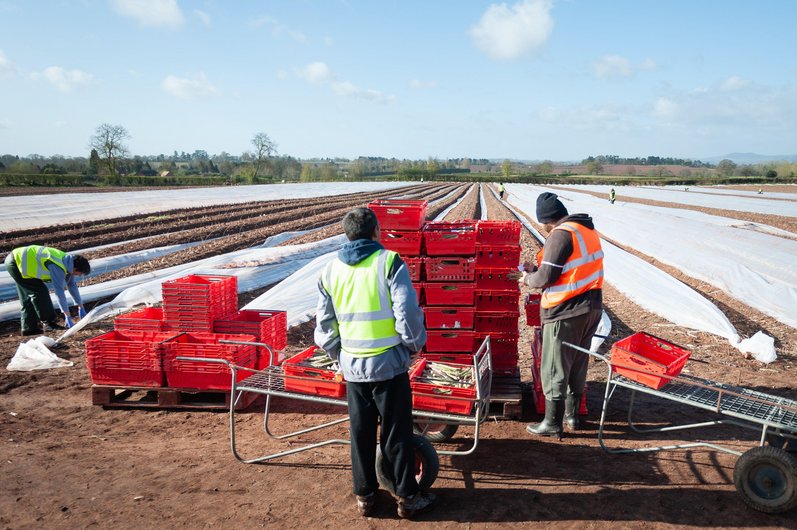UK’s seasonal agriculture visa scheme exposes migrant workers to serious risk of abuse, say rights experts

Migrant agricultural workers in the UK could face comparable risks to migrant labourers in the Gulf, advocacy groups and experts from the UK, Nepal and Bangladesh warned today.
Today sees the UK’s Farm to Fork summit, ahead of which government yesterday confirmed they will again be making 45,000 6 month long seasonal work visas available to the horticultural sector next year. Last week, in a joint letter to immigration minister Robert Jenrick, human rights NGOs and academics expressed concerns about continued abuses associated with the Seasonal Worker visa route, introduced in 2019 to address labour shortages in agriculture, which they said fails to meet international standards.
In 2023, 45,000 visas are available under the scheme, allowing workers to come to the UK for six months to carry out specific tasks in the horticulture sector.
Whilst UK government and non-government experts have raised the alarm about the serious risks to workers on the scheme since 2018, 2022 saw a series of media investigations that revealed widespread abuse of migrant workers, including from Nepal, on British farms. This included workers left in severe debt having paid thousands of pounds in recruitment fees to secure jobs in the UK. In some cases this is likely to amount to debt bondage, where an individual is trapped in an abusive situation because of debt obligations. Workers also reported discrimination and being left without work, as well as poor working and living conditions, with one in four not having access to a working toilet and nearly two thirds not feeling safe in their accommodation.
James Lynch, co-director of FairSquare, a UK-based human rights group which has worked extensively on migrant labour abuse in the Gulf, said:
“Migrant workers have long been and will for the foreseeable future remain crucial to Britain’s agricultural sector. But the British government’s design and implementation of this visa scheme leaves them horribly exposed to abuse, in a way that increasingly bears comparison to our research on the Gulf. When responsibility for worker protection is delegated by government to the private sector and when workers lack the full freedom to change employers, this leaves them acutely vulnerable to abusive working and living conditions, with demands for the payment of extortionate and illegal recruitment fees routine.”
Several of the letter’s signatories gave hard-hitting evidence to a House of Lords horticulture select committee inquiry last week, with Kate Roberts, head of policy at Focus on Labour Exploitation, describing the workings of the scheme as creating “a very risky situation”.
The British government’s position is that to protect migrant workers, it holds a small number of private recruitment firms – known as Scheme Operators – “responsible for managing the recruitment and placement of workers on UK farms, and ensuring their welfare in the UK”. The government cannot abdicate its responsibility for enforcing the rights of workers by delegating this to the private sector.
The government places no restrictions on where these operators can recruit from. In 2022 the Independent Chief Inspector of Borders and Immigration found that the Home Office “has not demonstrated that it has the mechanisms or capabilities in place to assure itself that scheme operators are meeting compliance requirements.”
In 2023, Scheme Operators unilaterally stopped recruiting from Nepal, in response to reports of worker abuse, with some beginning to recruit from Bangladesh. In its letter, the coalition of organisations and experts told the Home Office that its hands-off approach to regulating the scheme was short-sighted and unsustainable: “failure to address the underlying issues in the Scheme will simply lead to problems encountered in one country being replicated in another country, with another group of at-risk workers, and without avenues for redress in place for workers who have been left in debt by the scheme.”
Anurag Devkota of Lapsoj, a Nepali human rights organisation that advocates for the rights of migrant workers, said:
“For many years we have seen Nepali workers returning from the Gulf and Malaysia with terrible accounts of their working and living conditions, going unpaid, and all the while having to pay back debts they have taken on to migrate. It has been troubling to witness the same phenomena for workers coming back from the UK, where many expected a better experience.”
C R Abrar, Executive Director of the Refugee and Migratory Movements Research Unit, in Bangladesh, said:
“With recruitment starting up in Bangladesh, the UK government must urgently use all the levers and tools at its disposal to better protect migrant workers, who we know very well will be vulnerable to exploitative fee charging and poor treatment in the workplace.”
Background
The UK has relied on migrant workers to harvest fruit and vegetables for many decades. When the free movement of workers which came with the UK’s membership of the EU ended, growers immediately raised concerns about labour shortages. In response, the government introduced a scheme in 2018 to pilot a six-month visa for seasonal agricultural workers, with an initial quota of 2,500 visas. The scheme has grown by 2000% since 2019.
The signatories on the 11 May 2023 letter to Robert Jenrick are:
- James Lynch, Co-director, FairSquare
- Focus on Labour Exploitation (FLEX)
- Adis Sehic, Policy and Research Officer, Work Rights Centre
- Law and Policy Forum for Social Justice (Nepal)
- Dr. Chowdhury Rafiqul Abrar, Executive Director, Refugee and Migratory Movements Research Unit (Bangladesh)
- Caitlin Boswell, Policy & Advocacy Manager, Joint Council for the Welfare of Immigrants
- Victoria Marks, Director, Anti-Trafficking and Labour Exploitation Monitoring Unit (ATLEU)
- Caroline Robinson, Advisor, Worker Support Centre
- Dr Roxana Barbulescu, Associate Professor in Sociology and Social Policy, University of Leeds
- Dr Natalie Sedacca, Assistant Professor in Employment Law, Durham University

